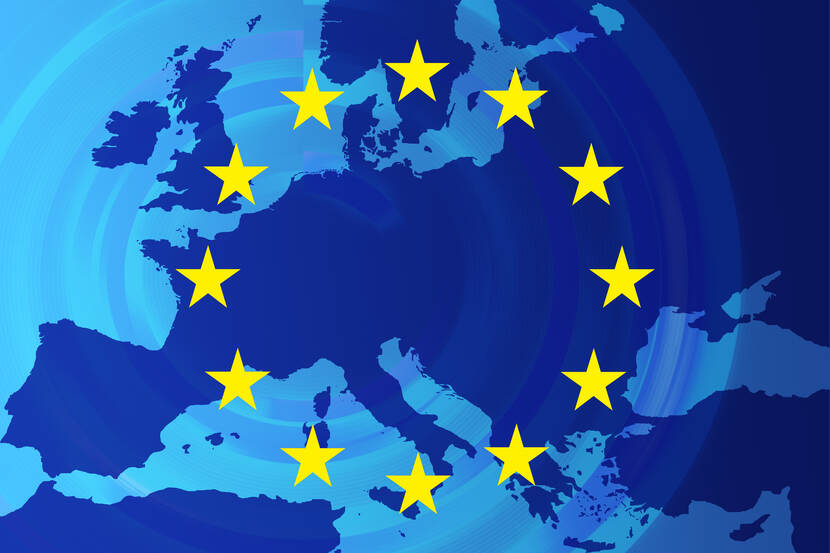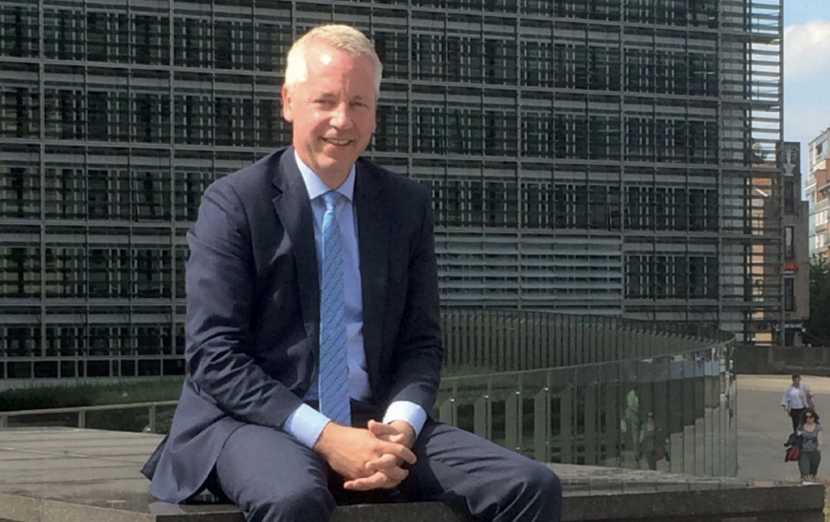EU's new Deforestation Regulation set to transform global commodity trading
The purpose of the European Union's Deforestation Regulation (EUDR) is clear: reducing deforestation and forest degradation that are caused by the European Union's (EU) production and consumption. Additionally, the EUDR is designed to increase demand in the European market for products that are legally produced and deforestation-free. The pace of implementation is high. The goal is to be ready by the end of this year. Julius Seinen (Ministry of Agriculture, Nature and Food Quality, LNV), Kaj van de Vorstenbosch (Ministry of Foreign Affairs, MFA), and Jouke Knol (LNV) elaborate on the implementation process thus far.

Deforestation and forest degradation are major causes of climate change and biodiversity loss, two key environmental challenges of our time. They are responsible for about 10-20% of global CO2 emissions annually. 'Global deforestation is predominantly caused by the conversion of forests to agricultural land (85%),' says Kaj van de Vorstenbosch, who is part of the climate team at the Inclusive Green Growth Department of the Ministry of Foreign Affairs.

The EUDR focuses on reversing the trend of ongoing deforestation and increasing efforts to protect and restore forests worldwide, says Van de Vorstenbosch. 'The specific aim of the regulation is to minimize deforestation and forest degradation caused by EU consumption and production, and to increase demand on the European market for goods and products that have been produced legally and without deforestation. The cornerstone of the regulation is the obligation for companies to demonstrate that products have been produced deforestation-free and legally when placing them on the EU internal market. The regulation entered into force on 29 June 2023 and its obligations will apply from 2025, with an exception for micro or small enterprises. They will have 24 months to prepare.'

Joint commitment of MFA and LNV
The international commitment of the Netherlands to the EUDR is a joint responsibility of the Ministry of Foreign Affairs (MFA) and the Ministry of Agriculture, Nature and Food Quality (see also Letter to Parliament, 2020). LNV works closely together with MFA to ensure that the EUDR has the effect that is intended. 'LNV is responsible for the implementation of the EUDR in the Netherlands,' says Jouke Knol, project manager of the national implementation of the regulation on deforestation-free products at the Ministry of Agriculture, Nature, and Food Quality (LNV). 'In this project we work together with the Netherlands Food and Consumer Product Safety Authority (NVWA) and the Dutch Customs authority, who will be responsible for enforcing the EUDR.'
The MFA is mainly responsible for developing complementary policies that promote the regulation's objective of reducing deforestation and forest degradation while preventing possible negative effects of the EUDR, such as the exclusion of small farmers and leakage of deforestation to other major consuming markets with lower standards.
The EUDR has a significant impact on countries that trade with Europe, although, as Van de Vorstenbosch notes, the exact nature of this impact varies and is difficult to determine. 'It will vary by country, but also by region, and by commodity sector. Firstly, because each supply chain functions differently and secondly, because different areas face different risks of deforestation. It could also happen that a country with a small export market to the EU will experience a relatively large impact because that country has barely begun to make its supply chains transparent.'
Promoting sustainability is a long-term commitment
Julius Seinen knows the complexity of the supply chains that fall under the EUDR. Seinen is a senior policy officer at LNV and member of the implementation project team. He has been working on the EUDR for several years 'Many of these commodity flows, originating a hundred or even two hundred years ago, still function largely in the same way,' he says. 'There are an incredible number of intermediaries involved. Farmers, traders, processors, etcetera. That often makes it difficult to trace where a product originated.'
Complicating matters further is that many smallholder farmers are subsistent farmers, who often lack the means to bear the costs of investments that new regulations like the EUDR require. Seinen: 'Obviously, the EUDR is intended to professionalize the supply chain and make all links transparent. At the same time, there's a risk that smallholder farmers will have to make investments that they simply do not have the means for. This might lead EU importers to say: in that case we'll get those products somewhere else. Then EU countries might, for example, not go to Peru for cocoa but to Ghana or Côte d'Ivoire instead. And what used to come from Peru, will flow to other markets with possibly less stringent sustainability requirements.'
Another risk is that companies will leave areas with a higher risk of deforestation, says Van de Vorstenbosch. 'In that case, we'll have even less influence on the sustainability process, while that's especially important in those places. Through the LNV Attaché Network and our Dutch Embassies, we receive responses to the EUDR. Many production countries are outspokenly critical, calling the measures taken by the EU colonial and demanding more cooperation, dialogue, and support in meeting the new standards. This is where the LNV Attaché Network plays a key role.’
'Many commodity flows, originating a hundred or even two hundred years ago, still function largely in the same way'
The EU responds to calls for increased cooperation and dialogue
'The EU is responding to this call, too,’ says Seinen. 'A Team Europe Initiative (TEI) has been launched to support countries, companies, producers, and farmers to meet the requirements of the EUDR. The aim is not to exclude farmers; the goal is to combat deforestation. If farmers simply continue to supply the same products to other countries, nobody benefits from that. Cooperation with these countries is thus crucial.'
Specifically, this TEI consists of three parts. Van de Vorstenbosch: 'A global hub for strategic coordination, information provision and outreach; the regional commitment to support producer countries through the 'Sustainable Agriculture for Forest Ecosystems' (SAFE) program; and a technical facility for demand-driven support to producer countries in the implementation of the regulation. The initiative is an important positive signal to producer countries that are increasingly critical of the regulation, especially about the lack of dialogue and support they perceive. For the time being, the following parties are a member of the TEI: the European Commission, France, Germany, and the Netherlands. The aim is to further scale up this group in the coming period and thus increase the impact of the initiative.'
A Team Europe Initiative has been launched to help producers and farmers meet the requirements'
Harmonization of implementation ensures a level playing field
Harmonized enforcement of the EUDR among Member States is important. But not all the Member States keep the same pace. Seinen: 'It's important that they do. If one Member State enforces the EUDR in a different way than the other, we create uncertainty for business. In other words, harmonization of implementation is required to ensure a level playing field across the EU and provide companies with the clarity they need.’
He goes on: ‘Some EU countries have more domestic operators in their supply chains than the Netherlands: Germany, and France, for example. Countries with a strong forestry sector such as, Finland, Romania, and Sweden have expressed their concerns, too. They are not against the EUDR per se, but they have questions about its practical feasibility and possible burden for operators. And then there are countries, including the Netherlands, where there is hardly any deforestation, and yet domestic operators must comply with the administrative requirements. These operators sometimes wonder what impact the EUDR will have on their business and to what end. It is important that we provide clarity to all those operators and traders as soon as possible, whilst keeping trade flows going.'
Checks where risks are highest
LNV actively addresses these concerns about the implementation of the EUDR. Knol: 'Many parties fear that the entire trade stream will come to a standstill. But that's not going to happen. Market participants must deliver documents that customs will check. And that's a simple procedure. The NVWA will assess the due diligence systems of companies and apply a risk-based approach.'
He continues: 'Each shipment must meet the requirements, but not everything is checked. That's simply impossible. The NVWA will check most, where risks are highest. And even if there are peculiarities – for example, an importer has not properly demonstrated that a soy product was produced according to local legislation – then the NVWA will first engage withe importer. And if his explanation is not convincing, a company may be granted more time to make corrections and improvements to their due diligence system.'
Framework EUDR
The European Union's Deforestation Regulation (EUDR) will enter into application on December 30, 2024. Under the Regulation, any operator or trader who places specified commodities on the European Union (EU) market, or exports from it, must be able to prove that the products do not originate from recently deforested land or have contributed to forest degradation, and have been legally produced.
The primary cause of deforestation is the expansion of agricultural land associated with the production of commodities such as cattle, timber, cocoa, soy, oil palm, coffee, rubber, and some of their derived products like leather, chocolate, tires, or furniture containing timber. As a significant economy and consumer of these commodities, which are connected to deforestation and forest degradation, the EU bears partial responsibility for this issue and aims to take the lead in addressing it. The EUDR applies to products imported into the EU and potentially exported, as well as products produced in the EU.
Impact assessment mid-2025 is first benchmark moment
One thing is clear: before the EUDR enters into application on December 30, 2024, there is still a lot of work to be done. Yet, Knol is optimistic about the progress of implementation in the Netherlands. 'Our pace is high. The goal is to be ready by the end of this year, including the NVWA and the Dutch Customs authority. We are confident that we will reach this goal. Nevertheless, there are still many issues that need our attention. For example, the NVWA needs to hire more inspectors with the right qualifications, which is not easily done in the current job market.'
Van de Vorstenbosch is happy with the Dutch pace, too. 'But to be successful, upscaling is necessary. The EUDR is an essential part of this, as well as an important political signal to the rest of the world in our global fight against deforestation, climate change and biodiversity loss.’
'I think it's important to point out that we don't know everything, yet,’ says Seinen. ‘As much as we would like to bring companies and countries up to speed to what awaits them, we are largely depending on the European Commission, which is ultimately responsible for the EUDR. Obviously, we’re trying to give as much information as possible, especially on Dutch progress and developments, but we’ll have to wait to see the full picture.’
'In mid-2025, the Commission will share an impact assessment,’ Van de Vorstenbosch concludes, ‘which will cover the impact of the relevant raw materials on deforestation and forest degradation. This will be the first benchmark moment when the impact of the regulation will be clear.'
This article is part of the 11th edition of the e-magazine Agrospecial titled "Impact of EU Deforestation Regulation worldwide" (originally published on June 5, 2024).
In this Agrospecial, the Netherlands Agricultural Network showcases the opportunities and challenges associated with the EUDR from the perspective of the LAN teams. They introduce us to their related work, provide insights into what is happening in their respective countries, and showcase examples of projects and actions the LAN is taking in promoting sustainable supply chains and responsible business conduct. Once again, cooperation is key, the LAN plays a crucial role in this work.